Long read: 333 days of Gaza genocide and 333 reasons why mastermind is US
By Humaira Ahad
The Israeli genocidal war, which has so far killed more than 40,700 Palestinians in Gaza, including a significant number of children and women, reached its 333rd day on Tuesday.
The brutal war was launched by the Tel Aviv regime on October 7 of last year, with substantial military and diplomatic support from the United States and other Western allies.
Despite 333 days of no-holds-barred genocide—killing almost 17,000 children and 12,000 women and spawning the worst humanitarian catastrophe, Israel has failed to achieve any of its stated military objectives.
According to human rights campaigners, the devastation unleashed on Gaza would not have been possible without the backing Israel has received from its Western allies, particularly the Joe Biden administration in Washington.
The United States has played a crucial role in what's unfolding in Gaza, providing both diplomatic cover and a continuous flow of weapons to the Israeli regime, ensuring the continuation of the violence and forced starvation that has destroyed countless lives in the besieged coastal territory over the past 11 months.
Since October 7 of last year, the US has repeatedly and unapologetically reaffirmed its “ironclad” support for the Israeli regime, becoming an equal partner in its crimes.
Here we list 333 reasons demonstrating the deep and direct complicity of the US in Israel’s genocidal war on Gaza. It proves the real mastermind is the US military-industrial complex.
Gaza still resilient after 333 days of genocidal war
— Press TV 🔻 (@PressTV) September 3, 2024
Ghada Ibrahim reports from Deir al-Balah. pic.twitter.com/xC1FqJAnOa
1. On October 7, 2023, US President Joe Biden stated that his administration’s support for the Israeli regime is "rock solid and unwavering."
2. Biden falsely claimed that Hamas beheaded babies on October 7, a statement later proven to be untrue.
3. The US President also falsely alleged that Israeli women were "raped, assaulted, and paraded as trophies."
4. Biden repeatedly defended Israel's bombing campaign in Gaza, insisting that Israel does not target civilians or journalists.
5. During a third phone call with Israeli Prime Minister Benjamin Netanyahu on October 10, 2023, Biden said, “I told him if the United States experienced what Israel is experiencing, our response would be swift, decisive, and overwhelming.”
6. On October 25, 2023, Biden questioned the reported Palestinian death toll, stating, “I have no notion that the Palestinians are telling the truth about how many people are killed. I’m sure innocents have been killed, and it’s the price of waging a war.”
7. In December 2023, Biden affirmed that the US would “continue to provide military assistance to Israel until they get rid of Hamas.”
Ayatollah Khamenei: US ‘definite accomplice’ of Zionist criminals in Gaza #GazaGenocide pic.twitter.com/qMG70tnpC1
— Press TV 🔻 (@PressTV) October 25, 2023
8. The US President declared, “My commitment to the safety of the Jewish people and the security of Israel, and its right to exist as an independent Jewish state, is unshakeable.”
9. Biden stated, “Were there no Israel, there wouldn’t be a Jew in the world who is safe.”
10. Hosting a reception at the White House, Biden remarked, “You don’t have to be Jewish to be a Zionist, and I am a Zionist.”
11. On November 15, 2023, the US abstained from a UN Security Council resolution calling for “urgent and extended humanitarian pauses.”
12. On December 8, 2023, US Secretary of State Antony Blinken stated, “We want to make sure that Israel has what it needs to defend itself against Hamas.”
13. On December 13, 2023, White House National Security Spokesperson John Kirby said, “Israel will do exactly what they say they’re doing, which is to continue to go after the terrorist leaders and to do so in a way that minimizes civilian harm.”
14. On January 3, the White House welcomed the assassination of prominent Hamas leader Saleh al-Arouri in an Israeli bombing in Beirut.
15. On January 11, Biden authorized military attacks against Yemen, which had been targeting ships bound for the occupied territories in the Red Sea to end the Israeli regime’s genocidal war on Gaza.
16. On January 18, Biden acknowledged that US strikes against Yemen were not deterring the country’s military, saying, "Are they stopping the Houthis? No. Are they going to continue? Yes."
17. On January 22, Washington reiterated its opposition to a ceasefire, supporting only pauses in the Israeli attacks on Gaza.
18. On February 20, the US vetoed another UN Security Council resolution calling for a ceasefire in Gaza.
19. On February 29, the US reaffirmed its support for Israel after the killing of at least 112 Palestinians as they approached trucks carrying humanitarian supplies in Gaza.
20. On March 5, US Vice President Kamala Harris expressed support for Israel in a meeting with Israeli war cabinet member Benny Gantz.
21. The US President has had more than 20 phone calls with Netanyahu since October 7, 2023.
22. Biden's deputy and Democratic Party presidential candidate Kamala Harris has been involved in each of these conversations.
23. In March, Harris stated, “As I have said repeatedly since October 7, Israel has a right to defend itself. President Joe Biden and I are unwavering in our commitment to Israel’s security.”
24. The US Vice President stated, “The threat Hamas poses to the people of Israel must be eliminated.”
25. Harris recalled, “Having grown up in the [San Francisco] Bay Area, I fondly remember those Jewish National Fund boxes that we used to collect donations to plant trees for Israel,” at an AIPAC (American Israel Public Affairs Committee) conference.
26. On October 30, 2023, US House Speaker Mike Johnson said, “We will stand like a rock with our friend and ally Israel.”
27. Johnson described the war against Palestinians in Gaza as a "conflict between good and evil, light and darkness."
28. The US House Speaker indicated that the House would pass a standalone supplemental Israel funding package without debate in the Senate.
29. Johnson also mentioned plans to offset Israel funding with budget cuts elsewhere in the US government.
30. The Republican lawmaker stated, “This special bond between Israel and the US transcends politics and diplomacy and is about much more than current events.”
31. “As a Christian, I know and believe that the Bible teaches clearly that we are to stand with Israel, and that God will bless the nation that blesses Israel,” Johnson told a crowd in October last year.
32. On November 14, 2023, US House Speaker Johnson termed calls for a ceasefire in Gaza “outrageous.”
33. In an April interview, Johnson defended Israel when questioned about Palestinian children being killed in Gaza.
34. Michigan Governor Gretchen Whitmer stated in October 2023, “We stand with Israel. And Israel has a right to defend itself.”
35. California Governor Gavin Newsom expressed unwavering support for Israel.
36. Newsom visited the occupied territories on October 20, 2023, to show his support.
37. Pennsylvania Governor Josh Shapiro condemned the "whataboutism" used to justify Hamas’ actions, stating there is "no moral equivalency here. Israel has a right to defend itself.”
38. Shapiro also denounced pro-Palestine protests opposing the Gaza conflict as anti-Semitic.
39. In April, Shapiro likened pro-Palestinian student protesters to the Ku Klux Klan.
40. US Transportation Secretary Pete Buttigieg openly expressed support for Israel.
Explainer: 333 days of Israeli-US genocidal war on Gaza
— Press TV 🔻 (@PressTV) September 3, 2024
Follow us on Telegram: https://t.co/B3zXG73Jym pic.twitter.com/oxQUnxVlz5
41. On March 5, former US President and Republican presidential candidate Donald Trump endorsed Israel’s war on Gaza, asserting his support for continuing the assault until “total victory” is achieved.
42. Trump has repeatedly opposed Palestinian rights and dignity, before and after the events of Oct. 7.
43. In December 2023, Michigan Republican Representative Tim Walberg declared that the US “shouldn’t be spending a dime on humanitarian aid” in Gaza.
44. Walberg stated that Gaza should be treated like “Nagasaki and Hiroshima—get it over quick.”
45. US Senator Lindsey Graham said on October 11, “We are in a religious war here, I’m with Israel.”
46. Graham advised Israel to “do whatever the hell you have to do to defend yourself. Level the place.”
47. The South Carolina lawmaker stated that no amount of civilian casualties in Gaza would prompt him to scrutinize Israel’s conduct.
48. US Senator Tom Cotton, R-Ark, remarked, “As far as I’m concerned, Israel can bounce the rubble in Gaza.”
49. On October 11, Ohio politician Max Miller predicted that Palestine would soon be “eviscerated and turned into a parking lot.”
50. Florida Representative Brian Mast wore an Israeli military uniform in Congress as a show of support.
51. In October 2023, Mast introduced an amendment to slow down humanitarian aid to Gaza, stating, “Any assistance should be slowed down—any assistance.”
52. In January, when asked about the babies killed by Israeli forces in Gaza, Mast replied, “These are not innocent Palestinian civilians.”
53. The lawmaker stated there’s "more infrastructure that needs to be destroyed" in Gaza.
54. Mast called the UN aid agency for Palestine, UNRWA, “moronic.”
55. In late February, Tennessee Republican Andy Ogles stated, “I think we should kill ’em all (Palestinian babies).”
56. In early March, Tennessee politician Chuck Fleischmann declared that Israel was not guilty of genocide, adding, “You can tell the Palestinians—I will never support them!”
57. US lawmaker Brad Sherman accused a Palestinian American of “trying to kill every Jew.”
58. In March, Representative Dan Goldman claimed the reported death toll of children killed in Gaza was false.
59. Goldman also said, "Israel is a democracy in an area surrounded by terrorists."
60. Palestinian-American lawmaker Rashida Tlaib faced criticism for supporting an event that raised awareness about the Nakba, the 1948 catastrophe that led to the mass killing and displacement of Palestinians by Israel.
61. Ilhan Omar, a US Representative for Minnesota, has faced scrutiny from her own party for condemning Israel and has even been accused of antisemitism.
62. Since the start of the Israeli onslaught on Gaza on October 7 last year, America has propagated several false claims. The US media has also launched a massive misinformation campaign.
63. The US government falsely claimed that Israel bombed the ‘al-Shifa’ hospital because it was allegedly a “cover” for Hamas’ military operations.
64. The US claimed that Israel is fighting Hamas, not the civilian population of Gaza, and that it is doing so in full compliance with international law.
65. US media falsely reported that Hamas raped and mutilated women on October 7. This claim was later debunked by several independent media outlets.
66. The US falsely claimed that ammunition and protective vests used by Hamas fighters were hidden behind MRI machines at al-Shifa hospital. Other ammunition was supposedly stored in nearby units or behind a “blast-proof door.”
67. The US claimed that the attack on Gaza’s Baptist Hospital, which killed 500 civilians, was carried out by Hamas. A fake video was circulated to shift blame to the Palestinian resistance group, but the claim was later debunked.
68. The White House claimed that Israel "feels very strongly" that they did not cause the hospital explosion. U.S officials suggested that the Gaza hospital blast was likely due to a Palestinian Islamic Jihad rocket misfire.
69. The US alleged that Hamas had a command center under Al-Shifa hospital to justify Israel's bombing of the hospital.
70. The White House and Pentagon falsely claimed to have evidence that Hamas was using Al-Shifa Hospital for military operations.
71. The US falsely asserted that it had intelligence indicating Hamas was holding captives at Gaza's Al-Shifa Hospital. No captives were found there.
72. The US falsely claimed that Hamas was using tunnels beneath Gaza hospitals for military operations and to hide Israeli captives.
US: We're mindful of the suffering inside Gaza and we're doing everything we can to help alleviate that.
— Press TV 🔻 (@PressTV) December 9, 2023
Everything they can: 👇 pic.twitter.com/icHBM1bDo6
73. The US claimed that Hamas used international funds to build terror tunnels.
74. American media broadcasted videos purportedly showing a Gaza hospital basement used by Hamas, a claim refuted by everyone, including the UN.
75. US officials falsely claimed that the Israeli military enacted tactical pauses for humanitarian purposes, allowing civilians to replenish stocks like food and water.
76. The White House insisted that Israel does not obstruct the provision of humanitarian aid to people in Gaza.
77. The US falsely claimed that Israel seeks to minimize civilian casualties in Gaza as much as possible.
78. The Pentagon stated that Gaza’s civilian population was not the target of Israeli military attacks.
333 days of genocide in Gaza: Israel has been killing more than 5 Palestinians per hour since October 7th.#GazaGenocide
— Press TV 🔻 (@PressTV) September 3, 2024
Follow: https://t.co/GKZwI4ehqL pic.twitter.com/jZdVKkXeKf
79. The US asserted that Israel's actions were aimed at protecting its people and insisted that it was a war of self-defense.
80. U.S. officials also declared that Israel was benefiting the world by fighting radicalism.
81. In May, the US falsely claimed that more aid was being delivered to Gaza, despite the UN reporting “catastrophic levels” of hunger among Palestinians.
82. The US military claimed aid was being delivered to Gaza via a floating pier, which was actually used mostly for military operations.
83. Biden announced plans for a military airdrop of food and supplies into Gaza, with the White House emphasizing that these airdrops would become "a sustained effort." However, these airdrops led to several civilian massacres.
84. In April, the United States vetoed a United Nations Security Council resolution that would have granted full membership to Palestine, denying it state recognition.
85. US Secretary of Defense Lloyd Austin ordered the deployment of the United States Navy's Carrier Strike Group 12, led by the USS Gerald R. Ford, in West Asia.
86. Israel requested Iron Dome interceptors from the US and President Biden assured that Washington would quickly provide additional equipment and resources to the Israeli regime.
87. US Secretary of State Antony Blinken stated that Washington would provide its "full support" to Israel, including sending guided missile launchers and F-35 fighter jets.
88. By October 10, more ships and troops were on their way to the occupied territories, and additional American troops were being prepared for deployment.
89. US aircraft carriers and their strike group were positioned in the eastern Mediterranean in support of the Israeli regime.
90. Three US naval warships were sent to the Mediterranean as a demonstration of support for the Tel Aviv regime.
91. A large number of aircraft were deployed to US military bases throughout West Asia.
92. UA special operations forces cooperated with the Israeli military in providing intelligence and planning attacks in Gaza.
93. As Israel launched a ground assault on Gaza, the UA sent an aid package worth approximately $2 billion in additional funding to support the regime.
94. On October 12, Secretary Blinken reiterated the US commitment to Israel's "security" during a joint press conference with Netanyahu.
95. On October 14, Defense Secretary Austin III announced that the US dispatched a second aircraft carrier to the eastern Mediterranean “to deter hostile actions against Israel or any efforts to widen this war.”
96. The US Air Force doubled the number of F-16, A-10, and F-15E squadrons stationed in the Persian Gulf region to intensify its land-based assault aircraft presence.
97. US officials stated that America would have an aerial armada of more than 100 attack planes when combined with four squadrons of F/A-18 jets for Israel.
98. The US claimed these aircraft would assist in intelligence gathering and in preparing for operations aimed at locating and rescuing the 150 captives.
99. The Pentagon dispatched a team of Special Operations personnel to the Israeli-occupied territories to assist in its war.
US police in riot gear have made arrests following scuffles with New Yorkers who were venting anger at the ongoing Israeli-US genocide in the Gaza Strip.#GazaGenocide pic.twitter.com/RLTYFWog4n
— Press TV 🔻 (@PressTV) September 3, 2024
100. On October 15, the White House announced plans to seek approval for an additional $2 billion weapons aid package for the Israeli regime.
101. Defense Secretary Austin ordered about 2,000 troops to be prepared for possible deployment to Israeli-occupied territories.
102. By October 17, five shipments of American weapons and equipment were dispatched to the Tel Aviv regime for use against Palestinians.
103. The US placed 2,000 troops on high alert and extended the deployment of an aircraft carrier in the Persian Gulf region.
104. On October 18, the US vetoed a UN Security Council resolution that called for a pause in the genocidal war to allow humanitarian aid into Gaza.
105. The US argued that the Un Security Council resolution did not adequately emphasize Israel's right to self-defense.
106. During an October 18 trip to occupied territories, President Biden declared that “Israel is not alone – and with US support, it will remain a safe, secure, Jewish, and Democratic state today, tomorrow, and forever.”
107. On October 19, one day after traveling to the occupied territories, President Biden urged Congress to increase military aid to Israel, claiming that Hamas aimed to "annihilate Israeli democracy.”
108. On October 20, Biden announced that the additional funds he requested from Congress would amount to around $14 billion.
109. On October 21, the Pentagon declared that two of its most potent missile defense systems—a THAAD battery and additional Patriot batteries—would be deployed to the West Asia.
110. A Republican plan, approved by the US Congress, allocated $14.5 billion in military aid for the Israeli regime.
111. A Wall Street Journal report stated that the United States had supplied Israel with a range of munitions, including "bunker buster" bombs, for its war on Gaza.
112. The WSJ report indicated that US arms shipments to Israel since the start of the war included 15,000 bombs and 57,000 155mm artillery shells, mostly transported on C-17 military cargo planes.
113. The US has also sent more than 5,000 unguided Mk82 bombs, more than 5,400 Mk84 bombs, about 1,000 small-diameter GBU-39 bombs, and almost 3,000 JDAMs.
114. The WSJ noted that some of the bloodiest Israeli attacks on the Gaza Strip involved the use of large US-made bombs, such as the one that destroyed an apartment complex in the Jabalia refugee camp, killing over a hundred people.
115. On December 8, the US vetoed another UN Security Council resolution calling for an immediate humanitarian ceasefire in Gaza.
116. On December 9, the Pentagon stated that President Biden used emergency authority to bypass congressional review and sell approximately 14,000 tank shells worth $106.5 million for immediate delivery to Israel.
117. On December 12, Biden declared, "Israel's security can rest on the United States.”
118. On December 29, the US government again used emergency authority to sell Israel artillery shells and related weapons worth $147.5 million.
119. On January 4, White House National Security Spokesman John Kirby stated that the US had "not seen anything" that would make it change its approach to Israel.
120. On January 18, US Department of State Spokesman Matthew Miller stated, "Our support for Israel remains ironclad.”
121. In January, US National Security Council spokesperson John Kirby called the South African genocide case at the International Court of Justice (ICJ) "meritless, counterproductive, and completely without any basis in fact whatsoever."
122. “The allegation that Israel is committing genocide is unfounded,” US State Department spokesperson Vedant Patel said in January.
123. In February, the Central Intelligence Agency (CIA) established a new task force to provide intelligence to the Israeli regime in its genocidal war on Gaza.
124. On February 13, US officials stated that the US would not punish Israel if its forces attacked Rafah city in southern Gaza without a plan to protect civilians.
125. On February 21, the US told the International Court of Justice (ICJ) that it should not order the unconditional withdrawal of Israeli forces from the Palestinian territories.
126. In February, the US Senate passed a $14 billion aid package for the Israeli regime.
127. The US began preparing to send Israel more weapons ahead of its planned Rafah invasion, stating, "Israel takes effective action to prevent gross violations of human rights."
128. On February 20, the US vetoed a UN Security Council resolution seeking an "immediate humanitarian ceasefire."
129. Following the Flour massacre in March, US officials stated, "Biden remains unwilling to make any major shifts in his policy toward Israel, including placing conditions on military aid to Israel."
130. The US House of Representatives introduced a bill calling for a reassessment of America’s relationship with South Africa, following the country’s genocide case against Israel at the ICJ.
500th US airlift of arms to Israel sparks more protests@RaminMazaheri2 reports from Chicago. pic.twitter.com/K9U6Bzkm1a
— Press TV 🔻 (@PressTV) September 3, 2024
131. Algeria proposed a motion to the UN Security Council to release a statement condemning the Flour massacre and blaming Israel, which was blocked by the US.
132. Biden called on Republicans to pass his foreign aid bill to "help ensure that Israel can defend itself."
133. In a meeting with Israel’s war cabinet on March 4, VP Harris reiterated US support for Israel’s right to defend itself and underscored America's unwavering commitment to Israel.
134. In March, US officials informed Congress that they had approved more than 100 arms sales to Israel since October 7.
135. Jack Lew, US Ambassador to Tel Aviv, endorsed Israel's claim that it was abiding by international law during its war on Gaza.
136. On March 19, US Congressional leaders and the White House reached a deal to bar funding for UNRWA, the organization responsible for delivering food and providing education in Gaza, until March 2025.
137. On March 21, US Senator John Barrasso stated that, in a meeting with Netanyahu, Senate Republicans told him, "Israel has every right to defend itself," and he responded that’s exactly what they continue to do.
138. On March 25, the UN Security Council passed a resolution demanding an immediate ceasefire for the remainder of Ramadan. The US abstained from voting in favor of the resolution.
139. The US House introduced a bill to re-evaluate relationship with South Africa over its genocide case against Israel at ICJ.
140. On March 30, the White House authorized $2.5 billion in weapons transfers to the Israeli regime.
141. On March 31, Republican Congressman Tim Walberg suggested dropping a nuclear bomb on Gaza to "get it over quick."
142. On April 1, a US State Department spokesperson stated, "We are committed to Israel’s right to self-defense, and this is a long-term commitment the US has made."
143. On April 9, Defense Secretary Austin said that the Pentagon had no evidence that Israel was carrying out genocide against Palestinians in the Gaza Strip.
144. Austin claimed that there was "no question" that there had been "far too many" civilian casualties in the war in Gaza.
145. An April 17 report by ProPublica found that Secretary Blinken did not act on State Department recommendations to sanction Israeli military units involved in rapes and killings of Palestinians.
146. On April 22, Blinken rejected the idea that Washington might have a “double standard” when applying US law to allegations of abuses by the Israeli military in Gaza.
147. On April 24, Biden signed a new military package that included around $17 billion in weapons for Israel.
148. On April 24, twelve Republicans in the US Senate sent a letter to the International Criminal Court's chief prosecutor, Karim Ahmad Khan, warning that any attempt by the ICC to pursue charges against Israeli officials over war crimes committed in the Gaza Strip would be interpreted "not only as a threat to Israel’s sovereignty but to the sovereignty of the United States."
149. The Senators told Khan, "Target Israel, and we will target you... [and] sanction your employees and associates, and bar you and your families from the United States. ... You have been warned."
150. On April 30, the US State Department said it found five units of the Israeli military responsible for gross violations of human rights in individual incidents, but stated they would continue to receive US military backing.
151. On May 14, Biden notified Congress of a $1 billion arms sale to Israel.
152. On May 11, a US State Department report found Israel's use of US weapons "likely" violated international law. In the same report, the US said Israel's assurances that it was following international law were "credible."
153. On May 21, Biden said that the request of the prosecutor of the International Criminal Court (ICC) to issue an arrest warrant against the leaders of Israel is cruel and that the US will always stand by Israel.
US a ‘successful co-perpetrator’ in Israeli genocide: Ex-UN officialhttps://t.co/rzXgJaRapk
— Press TV 🔻 (@PressTV) September 3, 2024
154. Biden called the ICC prosecutor’s move to issue arrest warrants against Netanyahu and Gallant “outrageous.”
155. Even before the ICC announcement, senior Republican lawmakers in the US submitted a letter to the chief prosecutor Karim Khan’s office, threatening to bar him and his family from the country if he applied for warrants against Israeli leaders.
156. Blinken and several US lawmakers said the ICC had drawn a false moral equivalence between Hamas “terrorists” and democratically elected "Israeli leaders."
157. On May 17, the US House of Representatives passed legislation aimed at forcing the administration of President Biden to reverse its decision to halt a shipment of bombs to Israel amid its invasion of Rafah.
158. The bill also proposed slashing budgets for the offices of the defense secretary, secretary of state, and the National Security Council unless Biden sends the 3,500 heavy-duty bombs in the delayed shipment to the Israeli regime.
159. The Biden administration said it is not altogether stopping weapons exports to Israel and is preparing to send another shipment worth over $1 billion to the Israeli regime, which includes tank ammunition.
160. The June Nuseirat massacre, which killed more than 270 Palestinians, was aided by intelligence support from the United States, as reports proved.
161. On June 7, Netanyahu was invited to address a joint session of US Congress, scheduled for July 24, 2024.
162. On June 17, the United States approved an arms sale for the Israeli regime to purchase 25 additional Lockheed Martin F-35 stealth fighter jets for $3 billion.
163. After pressure from the US government, two key Democrats in Congress supported a major arms sale to the Israeli regime that included 50 F-15 fighter jets worth more than $18 billion.
164. The US House passed a bill barring the State Department from using Gaza Health Ministry's daily death toll statistics.
165. On July 11, the United States resumed shipments of the 500-pound bombs, which had been halted in February.
166. On July 24, Netanyahu addressed a joint session of US Congress amidst large protests in Washington.
167. Vice President Harris condemned the pro-Palestine protests outside US Congress. Harris said she condemns “any individuals associating with the brutal terrorist organization Hamas, which has vowed to annihilate the State of Israel and kill Jews.”
168. Netanyahu received a standing ovation from American lawmakers as he entered the hall of Congress.
169. “As we defend ourselves on all fronts, I know that America has our back, and I thank you for it – all sides of the aisle,” Netanyahu said in Congress.
170. Amid protests against the Israeli PM outside the US Congress, Netanyahu received 52 standing ovations from both Democratic and Republican lawmakers.
171. After the address to Congress, Harris offered Netanyahu strong support for Israel’s "right to defend itself from terrorism."
172. On July 20, the US Department of State criticized the ICJ ruling on the Israeli occupation of Palestinian territories.
US sending arms, munitions to Israelis while claiming to push for Gaza ceasefirehttps://t.co/y78MiiMawC
— Press TV 🔻 (@PressTV) August 26, 2024
173. On August 7, US Ambassador to Japan Rahm Emanuel announced that the US would skip the atomic bombing peace memorial in Nagasaki because of the city's decision not to invite Israel to the ceremony.
174. On August 9, the US Department of State announced it would provide Israel with an additional $3.5 billion to spend on US-made weapons and military equipment.
175. On August 13, the US Department of State announced that it had approved a $20 billion weapons package sale to the Israeli regime, which included fighter jets and advanced air-to-air missiles.
176. Republican Representative Brian Mast compared all Palestinians to Nazis on the US House floor.
177. Mast said that Palestinian babies are not innocent civilians but "terrorists" who should be killed, that more infrastructure in Gaza needs to be destroyed, and that "It would be better if you kill all the terrorists and kill everyone who are supporters."
178. Donald Trump's son-in-law, Jared Kushner, stated that "Gaza's waterfront property could be very valuable," that Israel should bulldoze an area of the Negev desert and move Palestinians there.
179. Representative Tim Walberg stated that nuclear weapons should be used against Palestinian civilians, "like Nagasaki and Hiroshima," to "get it over quick."
180. Several US universities initiated disciplinary proceedings against pro-Palestine protesters, accusing them of violating student codes of conduct.
181. At New York University (NYU), pro-Palestine students were required to write "coerced confessions of wrongdoing" to have disciplinary charges against them dropped.
182. The Massachusetts Institute of Technology (MIT) suspended 20 students for participating in pro-Palestinian protests.
183. NYU updated its non-discrimination policy to classify criticism of Zionism as a prohibited form of discrimination, making it a protected category.
184. Harvard University updated its policies to prohibit overnight camping, chalk writing, and unapproved signs or displays to suppress pro-Palestine protests.
185. Indiana University updated its policies to ban all "expressive activity" between 11 p.m. and 6 a.m. in an effort to stifle pro-Palestine support.
186. The Hillel Foundation, a Zionist campus organization, collaborated with the Secure Community Network, a Zionist security organization, on 50 campuses to provide full-time intelligence monitoring of pro-Palestine protests.
187. US police employed various tactics to crack down on pro-Palestine protesters, including the use of pepper balls, tasers, tear gas, mass arrests, clearing unauthorized encampments, and physically assaulting both students and professors.
188. On May 19, US police used force and arrested several demonstrators at a pro-Palestine protest in Brooklyn, New York.
189. US police also deployed personnel armed with "long-range firearms" at universities across the country.
190. The New York Times reported that more than 3,000 student protesters were arrested across the country.
191. American business tycoons coordinated efforts in a WhatsApp group to urge New York Mayor Eric Adams to crack down on the encampment at Columbia University. They offered to fund private investigators to assist police and made donations to Adams's 2025 campaign.
192. On April 22, Biden criticized and condemned the pro-Palestine protests, labeling them as anti-Semitic.
193. On April 24, US House Speaker Mike Johnson said at Columbia University, "Congress will not be silent as Jewish students are expected to run for their lives and stay home from their classes hiding in fear."
194. Texas Governor Greg Abbott said the protesters "belong in jail" and described the protests as "hate-filled, anti-Semitic events," insisting that anyone participating should be expelled.
195. Senate Republican Leader Mitch McConnell called the protests "a dangerous situation" and stated, "there's also antisemitism, which is completely unacceptable."
196. On May 12, Trump described pro-Palestine protesters as "anarchists, jihadist freaks, and anti-American extremists who are trying to tear down our American flag." "If you come here from another country and try to bring jihadism, anti-Americanism, or antisemitism to our campuses, we will immediately deport you. You'll be out of that school," he stated.
197. House Speaker Mike Johnson described US universities as "havens for antisemitism" where Jewish students do not feel safe.
198. On May 1, the US House of Representatives passed the so-called "Antisemitism Awareness Act."
199. The act aims to defund many colleges and universities across the US and punish protestors speaking out against the Israeli military’s genocidal war crimes.
200. The Antisemitism bill, which equates anti-Zionism with antisemitism and seeks to curb criticism of the Israeli regime, is also making its way through the US Senate.
✍️ Feature -Devil’s advocate: US State Dept. spox Vedant Patel as mouthpiece of Zionist regime
— Press TV 🔻 (@PressTV) August 28, 2024
By Maryam Qarehgozlouhttps://t.co/nd7PLCGI5M pic.twitter.com/bNz2kztjj3
201. An investigation by The Guardian found that the US government used special mechanisms to protect the Israeli regime from domestic human rights laws, enabling continued weapons shipments.
202. In March, US officials stated that an additional 1,800 MK84 2,000-pound bombs and 500 MK82 500-pound bombs had been approved for the Tel Aviv regime.
203. In May, Israel used two US-made GBU-39 missiles during the Tel al-Sultan massacre, which killed nearly 50 Palestinians, as Israeli forces set fire to tents in Rafah, southern Gaza.
204. In June, two US officials stated that Washington had transferred 10,000 2,000-pound bombs and thousands of Hellfire missiles to the Israeli regime since October 7.
205. In late June, an Israeli official said the Biden administration would soon transfer a delayed shipment of 500-pound bombs to Israel.
206. In mid-July, a US official confirmed that the United States was resuming transfers of 500-pound bombs to the Israeli regime.
207. In August 2024, the Biden administration approved a $20 billion arms sale to the Israeli regime, including F-15 fighter jets, tank shells, and mortar rounds.
208. By December 2023, the US had sent 230 cargo planes and 20 ships loaded with weapons and military equipment to Tel Aviv.
209. The Wall Street Journal reported that the US delivered approximately 1,000 MK-82 500-pound bombs and KMU-572 Joint Direct Attack Munitions (JDAMs) to Tel Aviv, which can turn unguided munitions into precision-guided bombs.
210. The US provided roughly 21,000 precision-guided munitions to the Israeli regime from October to March.
211. Other types of munitions and weapons sent include tens of thousands of 155mm artillery shells, thousands of bunker-buster munitions, and 200 kamikaze drones.
212. The Biden administration finalized a deal to supply large numbers of F-35 and F-15 fighter jets to the Israeli regime.
213. The weapons deal also included the provision of Apache helicopters to Tel Aviv.
214. Israeli regime became the first US ally to receive the advanced F-35 aircraft from it.
215. The US has provided around $5.2 billion to the Israeli regime for systems that deter missiles and other airborne threats, both long and short-range.
216. On July 31, Defense Secretary Austin reiterated America's support for Israel, stating, “We certainly will help defend Israel. You saw us do that in April. You can expect to see us do that again.”
217. In November 2023, the US deployed its Air Force team to the Israeli-occupied territories to assist with targeting, sending officers specializing in providing information and intelligence for conducting airstrikes and firing long-range artillery weapons.
218. In November, the US Air Force issued deployment guidelines for its officers, including intelligence engagement officers, heading to the Israeli-occupied territories.
219. The US team of targeting officers provided satellite intelligence to the Israeli regime for offensive targeting.
220. The US deployed aircraft and warships to its military bases in the West Asia and ordered additional warplanes to support existing A-10, F-15, and F-16 squadrons at these bases amid heightened tensions.
221. In August, Defense Secretary Austin announced that the US was taking additional measures to support the Israeli regime.
222. Austin ordered the deployment of more ballistic missile defense-capable cruisers and destroyers to the West Asia region.
223. He also announced that an additional fighter jet squadron will be sent to the region as a means to protect the Tel Aviv regime.
224. Austin said the USS Abraham Lincoln aircraft carrier strike group will be moved to the West Asia to maintain a carrier strike group presence.
225. Late last year, the Biden administration sent the USS Gerald R. Ford carrier strike group and another warship to the Mediterranean Sea.
226. By December, there were 19 US warships in the region, with seven in the Eastern Mediterranean and 12 others in the Red Sea, Arabian Sea, and Persian Gulf.
✍️ Feature -Devil’s advocate: US State Dept. spox Vedant Patel as mouthpiece of Zionist regime
— Press TV 🔻 (@PressTV) August 28, 2024
By Maryam Qarehgozlouhttps://t.co/nd7PLCGI5M pic.twitter.com/bNz2kztjj3
227. On August 23, Biden approved five major arms sales to the Israeli regime for F-15 fighter aircraft, tank ammunition, tactical vehicles, air-to-air missiles, mortar rounds, and related equipment. The total value of the five weapons sales exceeds $20.3 billion.
228. The US also provided Israel with jet fuel.
229. The US has sent so many arms to the Israeli regime since October 7 that the Pentagon has struggled to find sufficient cargo aircraft to deliver the ammunition.
230. The US sent at least 14,000 MK-84 2,000-pound bombs from early October to late June to Tel Aviv.
231. One more shipment of 1,800 MK-84s is scheduled to be sent, according to reports.
232. The US also delivered 100 2,000-pound BLU-109 bunker-buster bombs to Tel Aviv between October 7 and December 1.
233. On October 9, 2023, the Jabalia refugee camp massacre killed at least 69 people. The U.N. Office of the High Commissioner for Human Rights (OHCHR) reported that “one or two GBU-31 air-dropped munitions were used.” The GBU-31 is made from a US-made 2,000-pound MK 84 or BLU-109 bomb and a JDAM guidance kit.
234. On October 17, 2023, the Israeli military bombed the al-Lamdani family house in Khan Yunis, southern Gaza Strip, killing nearly 40 people. Remnants of a US-made MK-84 2,000-pound bomb were found at the site.
235. On October 25, 2023, Israeli airstrikes devastated the Al Yarmouk neighborhood in Gaza City, killing at least 91 people, including 39 children. A U.N. assessment determined that Israeli forces dropped several US-made 2,000-pound GBU-31 air-dropped munitions in the attack.
236. As of June, at least 2,600 of these "small-diameter" bombs, which are 250-pound GBU-39 munitions, have been supplied to the Israeli regime.
237. Israel received an expedited shipment of 1,000 Boeing-made GBU-39s in early October.
238. The US approved the transfer of more than 1,000 GBU-39 bombs to the Israeli regime on April 1, the same day Israeli forces bombed a World Central Kitchen convoy.
239. Military experts suggest that the Israeli regime has received far more GBU-39 bombs than officially reported.
240. White House spokesperson John Kirby described Israel’s use of GBU-39 bombs as "indicative of an effort to be discreet, targeted, and precise."
US has sent over 50,000 tons of weaponry to the Israeli regime since Oct. 7, including 500 airlifts and 107 sea shipments. pic.twitter.com/1PYb801sZT
— Press TV 🔻 (@PressTV) August 26, 2024
241. On January 9, Israeli forces bombed a residential building in a "safe zone," killing 18 people, including 10 children. Fragments of a US-made Boeing GBU-39 were recovered from the rubble.
242. On May 13, Israeli forces bombed a school sheltering displaced civilians in Nuseirat, killing up to 30 people. Remnants of a US-made GBU-39 were recovered at the site of the strike.
243. On May 26, an Israeli airstrike on a displacement camp in Rafah killed at least 46 people. The tail of a US-made GBU-39 bomb was found at the scene.
244. On June 6, Israel used at least two GBU-39 munitions in an airstrike on the UN-run Al-Sardi school in Nuseirat, central Gaza. The strike killed at least 40 people, including nine women and 14 children.
245. A US-made navigation device manufactured by Honeywell was also found at the UN school in Nuseirat.
246. On August 10, more than 100 Palestinians were killed in an Israeli airstrike on the Al-Tabin school in Gaza City. Paramedics reported finding bodies "ripped to pieces" and many unidentifiable. Remnants of US-made GBU-39 small-diameter bombs were found at the scene.
247. On October 10, an Israeli airstrike on the Al-Najjar family home in Deir al-Balah, central Gaza, killed 24 civilians. A US-supplied JDAM was used in the attack.
248. On March 27, Israel attacked the Emergency and Relief Corps of the Lebanese Succour Association, a humanitarian organization, killing seven emergency and relief volunteers in southern Lebanon. The airstrike utilized a US-made JDAM guidance kit attached to an Israeli 500-pound bomb.
249. On July 13, Israel bombed Al-Mawasi, an Israeli military-designated so-called "safe zone," killing over 90 people. Remnants of a US-made JDAM were found at the scene.
250. On June 8, Israeli forces killed nearly 300 Palestinians at the Nuseirat refugee camp in central Gaza. Remnants of US-made Hellfire missiles were found at the site of the massacre.
251. Video footage showed US-made Apache helicopters firing several Hellfire missiles into the Nuseirat refugee camp.
252. On June 23, an Israeli airstrike on a health clinic in Gaza City killed five people. The rocket motor of a US-supplied Hellfire missile was found at the medical facility.
253. On July 14, Israel struck the Abu Oraiban school, killing at least 22 people. US-made Hellfire missile fragments were found at the school, including parts of its guidance system and motor. Remnants of a Boeing-made GBU-39’s tail section were also recovered at the site.
254. On January 29, Hind Rajab, a 6-year-old girl, was the sole survivor after her family’s car was attacked by Israeli tanks. Her pleas for rescue were heard worldwide. The Palestine Red Crescent Society dispatched an ambulance with two emergency workers to save Rajab, but an Israeli tank opened fire, killing both paramedics. A US-made M830A1 120mm tank round was recovered from the site.
255. By December 1, 2023, at least 57,000 155mm artillery shells had been delivered by the US to the Israeli regime. Netanyahu specifically requested 155mm artillery shells from US lawmakers in mid-November.
256. On December 29, the White House notified Congress that it had approved the sale of an additional 57,021 155mm shells to the Israeli regime.
257. President Biden invoked emergency authority to bypass the congressional review period for this arms sale to Tel Aviv.
258. The Israeli military announced last year that it fired over 100,000 artillery rounds during the first 40 days of its ground invasion of Gaza.
259. These rounds were likely fired by Israeli forces using US-made howitzers.
260. The Israeli military stated that US artillery plays a "central role" by providing "intense fire cover" for its ground forces.
"It is a day of shame for Western governments."
— Press TV 🔻 (@PressTV) August 19, 2024
Norwegian physician @DrMadsGilbert slams Western governments for not pressuring the US to stop the genocide in Gaza. pic.twitter.com/BoplQvMlet
261. On October 16, Israeli forces fired 155mm artillery shells containing white phosphorus into southern Lebanon, killing nearly 9 people. The production codes on the shells indicated they were made in the US.
262. Israel reported on October 19, 2023, that US Air Force cargo planes delivered the first tranche of US-made David light armored vehicles, part of a $22 million arms deal.
263. On October 12, 2023, Blinken met with Israeli President Isaac Herzog and Prime Minister Netanyahu, reaffirming America's support for the Israeli regime.
264. Blinken told Netanyahu, "If you’ll permit me a personal aside, I come before you not only as the US Secretary of State but also as a Jew."
265. On October 16, 2023, Blinken again traveled to the occupied Palestinian territories to meet Herzog, Netanyahu, War Minister Yoav Gallant, and the Israeli war cabinet.
266. Accompanying Biden, Blinken visited the occupied Palestinian territories again on October 18, 2023.
267. On November 2, 2023, Blinken met with Herzog, Netanyahu, Israeli Minister Benny Gantz, and opposition leader Yair Lapid.
268. On November 30, 2023, Blinken was again in Tel Aviv to meet Herzog, Netanyahu, Lapid, and Gallant.
269. Blinken traveled to the occupied territories again on January 8 to meet the Israeli President, Prime Minister, and the war cabinet.
270. From February 6 to 8, Blinken was in the occupied Palestinian territories again to met Herzog, Netanyahu, Gallant, Gantz, Lapid, and others.
271. On March 22, Blinken again traveled to the occupied Palestinian territories yet again.
272. On April 30, Blinken again embarked on a two-day tour to Tel Aviv. He also visited the Karem Shalom border crossing and the Port of Ashdod.
273. Blinken was again in the occupied territories on June 10 to meet Netanyahu and others.
274. On August 18, Blinken met the Israeli President, Prime Minister, and War Minister in Tel Aviv in his most latest visit.
275. On October 13, 2023, Defense Secretary Austin was one of the first senior US officials to travel to the occupied territories and meet with Israeli War Minister Yoav Gallant.
276. During the visit Austin declared, "I am here in person to make something crystal-clear: US support for Israel is ironclad."
277. In December 2023, Austin was again in the occupied Palestinian territories.
278. On December 2, 2023, Austin stated that "the United States will remain Israel’s closest friend in the world. Our support for Israel’s security is non-negotiable. And it never will be."
279. On December 18, 2023, Austin declared that American support for Israel is "unshakeable."
280. On March 5, 2024, Austin met with Israeli War Cabinet Member Benny Gantz.
281. On April 9, 2024, Austin told the US Senate Armed Services Committee that the Pentagon had "no evidence" Israel was committing genocide against Palestinians in the Gaza Strip.
Countries fueling Israel’s Gaza genocide may be complicit in war crimes: Experts
— Press TV 🔻 (@PressTV) August 22, 2024
Follow us on Telegram: https://t.co/B3zXG74hnU pic.twitter.com/a422hx3nk0
282. In a meeting with Gallant in June, Austin said, "The United States will always support Israel’s right to defend itself, and the United States will always ensure that Israel has what it needs to defend itself."
283. The US Defense Secretary affirmed that the US is committed to ensuring Israel can "defend itself against Tehran and resistance groups in the region."
284. Austin assured the Israeli War Minister that the United States will always ensure that Israel has what it needs to "defend" itself.
285. "You can see that profound commitment once again in our recent agreement on a third squadron of F-35s for Israel. We stand together to ensure that Iran, the source of much of the region’s violence and instability, never achieves a nuclear weapon," Austin said at the time.
286. The Pentagon chief stated that Israel is fighting a "cruel and ruthless foe" in Gaza.
287. In June, Austin revealed that since October 7, he had spoken with Gallant over 50 times by phone.
288. In November 2023, several American celebrities, including the CEO of Tesla and X Elon Musk, visited the occupied territories. During his visit, he met with Israeli officials, including Prime Minister Benjamin Netanyahu and President Isaac Herzog.
289. Trump's daughter, Ivanka Trump, and son-in-law, Jared Kushner, visited occupied territories in December 2023.
290. The US formed a coalition to support Israel against Yemen in the Red Sea. In solidarity with Palestine and in response to the unrelenting aggression by the Israeli regime in Gaza, Yemen has been striking ships bound for the occupied territories.
291. On October 19, 2023, the US reported that the United States Navy destroyer USS Carney shot down three land-attack cruise missiles and several drones heading toward Israel, launched by Yemen.
292. In December, the Pentagon announced a military coalition of 10 countries, including the United States, Britain, and Spain, to counter Yemeni attacks.
293. Since January 12, the US and UK together have led coalition air and missile strikes against the Yemeni military.
294. On February 5, the US carried out additional strikes against Yemen in a show of support for the Israeli regime.
295. On November 14, 2023, Yemeni armed forces fired numerous missiles toward the city of Eilat in the occupied territories. The following day, the US reported that the USS Thomas Hudner shot down a drone fired from Yemen. Yemen didn't confirm it.
296. On November 23, 2023, the US stated that the destroyer USS Thomas Hudner had shot down several drones launched from Yemen. Yemen didn't confirm it.
297. On November 29, 2023, it was reported that the US Navy destroyer USS Carney shot down a Yemeni KAS-04 drone in the Bab-el-Mandeb Strait. Yemen didn't confirm it.
Harris says Israel has 'right to defend itself', loses Muslim group supporthttps://t.co/wl0EckuogH
— Press TV 🔻 (@PressTV) August 23, 2024
298. On December 6, 2023, Yemen launched several ballistic missiles at Israeli military posts in Eilat. The USS Mason reportedly shot down a drone launched from Yemen. Yemen didn't confirm it.
299. The US Navy reportedly shot down 14 drones on December 16, 2023. Yemen didn't confirm it.
300. On December 26, 2023, Yemen carried out drone attacks on Eilat and other parts of Israel. The US claimed to shot down several Yemeni drones.
301. On January 11, the US raided a ship off the coast of Somalia that was bound for Yemen.
302. On January 12, the US and US conducted a series of airstrikes against Yemeni civilian areas.
303. On January 13, the US struck a radar site in Sanaa, Yemen.
304. On January 14, American and British airstrikes were reported in Hodeida, Yemen.
305. On the same day, American spy planes were spotted in the skies of Yemen.
306. On January 16, the US claimed to have struck four Yemeni anti-ship ballistic missiles. Yemen didn't confirm it.
307. On January 18, the US and UK conducted airstrikes in the vicinity of Sanaa airfield.
308. On February 3, the US and UK carried out strikes against various civilian sites in Yemen.
309. On March 11, the US and UK conducted 17 airstrikes against port cities and towns in western Yemen.
Halt on US weapons exports to Israel only way to end genocide in Gaza, American journalist says
— Press TV 🔻 (@PressTV) August 18, 2024
Follow Press TV on Telegram: https://t.co/B3zXG74hnU pic.twitter.com/sIAJYloxU1
310. On March 27, the US Navy reported that it had shot down four Yemeni UAVs. Yemen didn't confirm it.
311. On April 10, the US military reported that it had attacked several drones belonging to Yemen. Yemen didn't confirm it.
312. In early May, Yemen reported that at least 18 people were arrested on charges of spying for the U.S. and Israel.
313. On May 31, the U.S. and Britain struck several locations in Yemen.
314. On June 6, Yemen arrested an undisclosed number of spies, busting an "American-Israeli spy network." The spies were reportedly recruited by the erstwhile American Embassy in Yemen.
315. On June 7, the US and UK carried out airstrikes on Hodeida International Airport and the Port of Salif in Yemen.
316. On June 13, the US claimed that it attacked Yemeni patrol boats, an unmanned surface vessel, and a drone in the Red Sea. Yemen didn't confirm it.
317. On June 15, the US reported that it had attacked radar systems in Yemen.
318. On June 17, the US and UK carried out at least six airstrikes on Hodeida International Airport and four on the island of Kamaran.
319. On June 22, the US reported that it targeted three Yemeni uncrewed surface vessels in the Red Sea. It wasn't confirmed by the Yemeni side.
320. On July 11, the US and UK launched five airstrikes, hitting targets in the Ras Isa area located northwest of Al Hudaydah.
321. On July 14, the US and UK carried out an airstrike in the Midi District of Hajjah Governorate and two airstrikes on Hodeida International Airport.
322. The US claimed to strike the al-Buhaisi area in Al Hudaydah Governorate.
323. On July 19, a ballistic missile and three UAVs fired by Yemen at Tel Aviv were reportedly intercepted by the US. Yemen, however, said the target was hit.
Despite US denials, Gaza residents show bomb fragments to the media, saying that US-made bombs are hitting innocent women and children.
— Press TV 🔻 (@PressTV) July 17, 2024
Follow Press TV on Telegram: https://t.co/B3zXG73Jym pic.twitter.com/y9DMgTBCUR
324. On July 21, the US and UK carried out two airstrikes on the Buhais area in Hajjah Governorate and four airstrikes on Ras Isa in the Al Hudaydah Governorate in Yemen.
325. On July 26, the US and UK carried out four airstrikes on Kamaran Island, Yemen.
326. On August 5, the US claimed that it had targeted three Yemeni UAVs over the Gulf of Aden and an anti-ship ballistic missile in the Red Sea. Yemen didn't confirm it.
327. On August 12, a UAV operated by the US-led coalition carried out an airstrike on Kamaran Island, Yemen.
328. On August 15, the US and UK carried out an airstrike in As Salif District, Yemen.
329. On August 21, the US and UK carried out three airstrikes in the As Salif District.
330. On August 22, the US military reported that it had targeted two Yemeni military UAVs over the Red Sea. Yemeni side didn't confirm it.
331. On August 23, the US claimed that it had targeted a missile system in Yemen. Yemeni side didn't confirm it.
332. In mid-August, the ‘Principal Deputy Spokesperson’ for the US Department of State, Vedant Patel, justified Israeli attacks on civic buildings in Gaza, stating that protected facilities "may lose their status when they are used by combatants."
333. In August, the US announced that the Netzah Yehuda Battalion, an Israeli military unit found by the United States to have committed gross violations of human rights, would continue to receive US funding.

Remembering Abdel Aziz Al-Rantisi, Hamas co-founder and ‘Lion of Palestine’
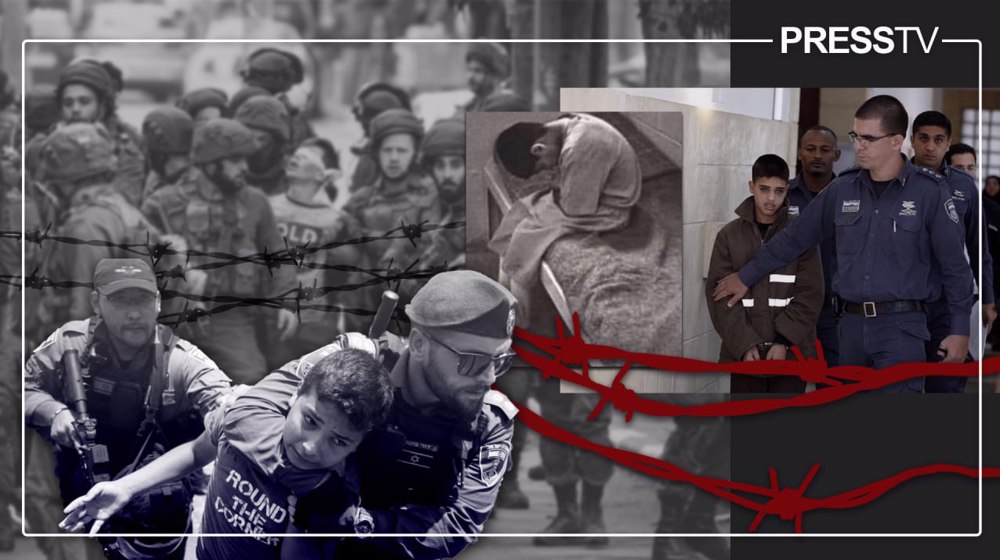
The case of Ahmad Manasra: How Israeli military courts target Palestinian children
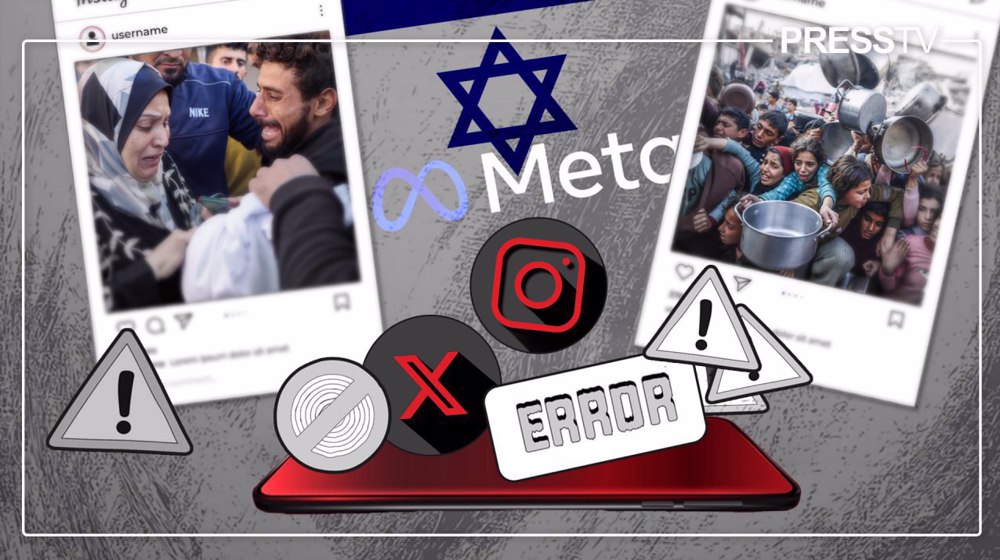
Israel-Meta nexus stifles pro-Palestine voices on Facebook, Instagram amid genocide
Hayya: Hamas ready to hold talks for ‘comprehensive’ peace deal
Iran strongly condemns 'brutal' US airstrikes on Yemen’s fuel port
IRGC kills ringleader of terror group behind deadly attacks in SE Iran
IAEA deputy chief to visit Tehran for technical discussions: Iran nuclear spox
Trump induces socio-economic turmoil in Washington
VIDEO | The story of Areej: Channeling grief purposefully
VIDEO | Press TV's news headlines
VIDEO | GoT actress on life before and after Gaza



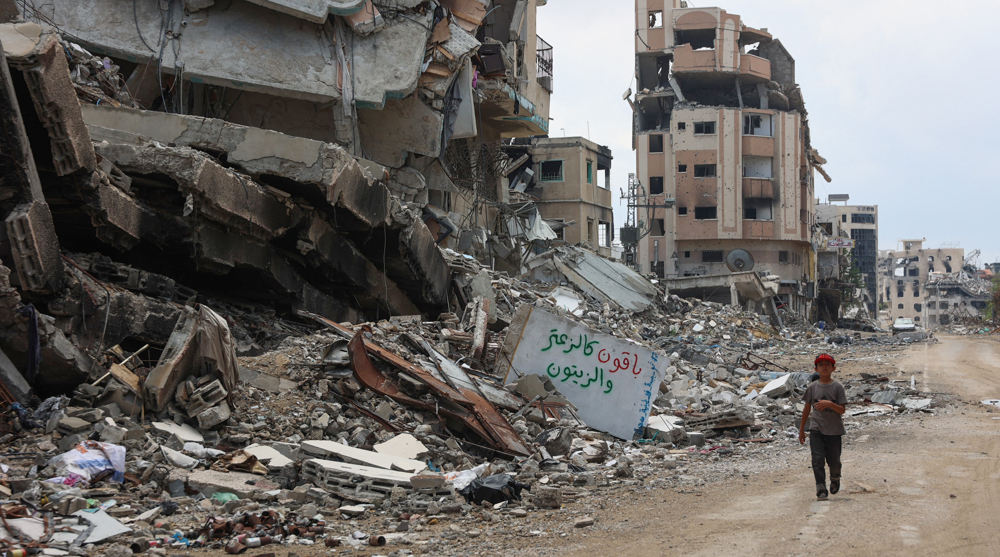
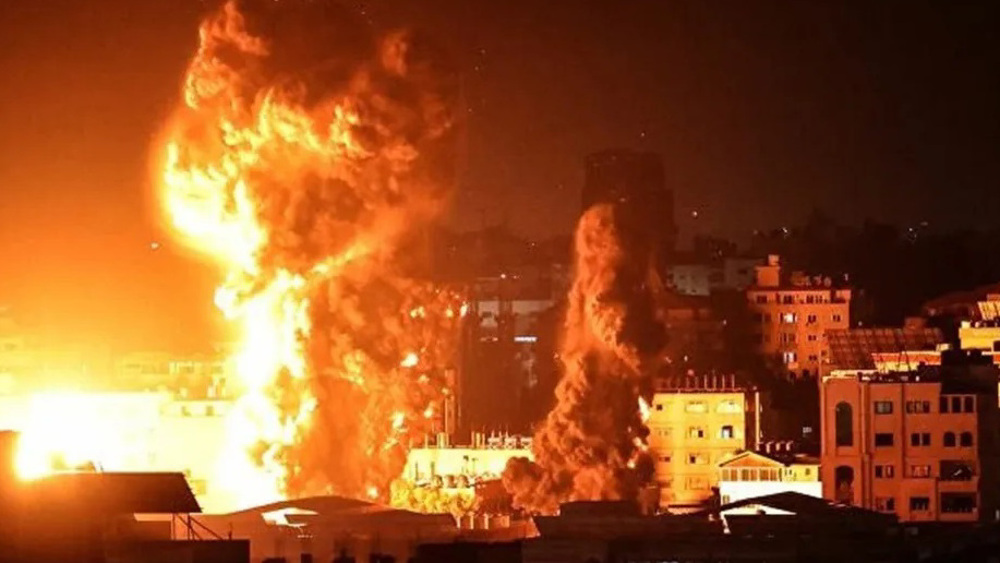
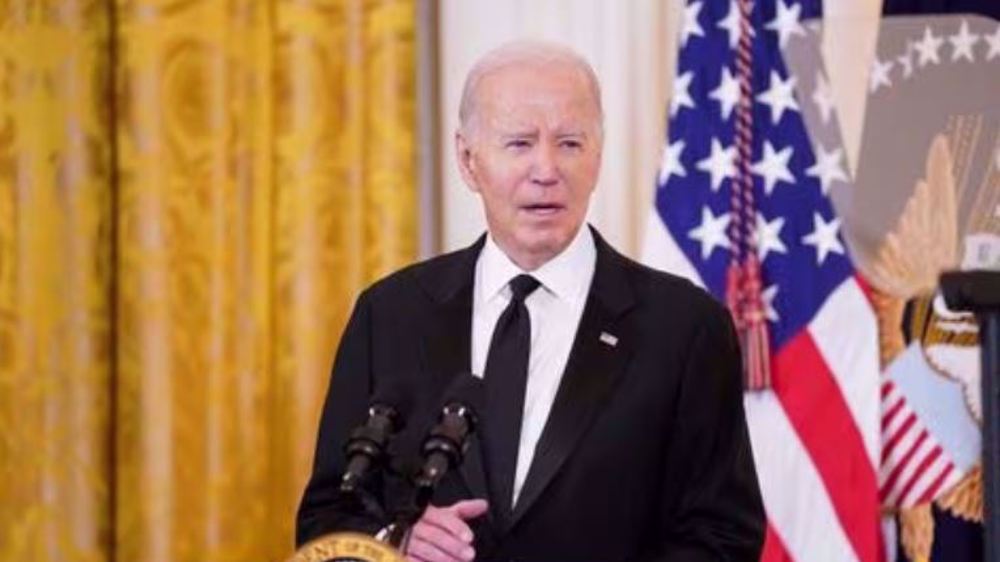
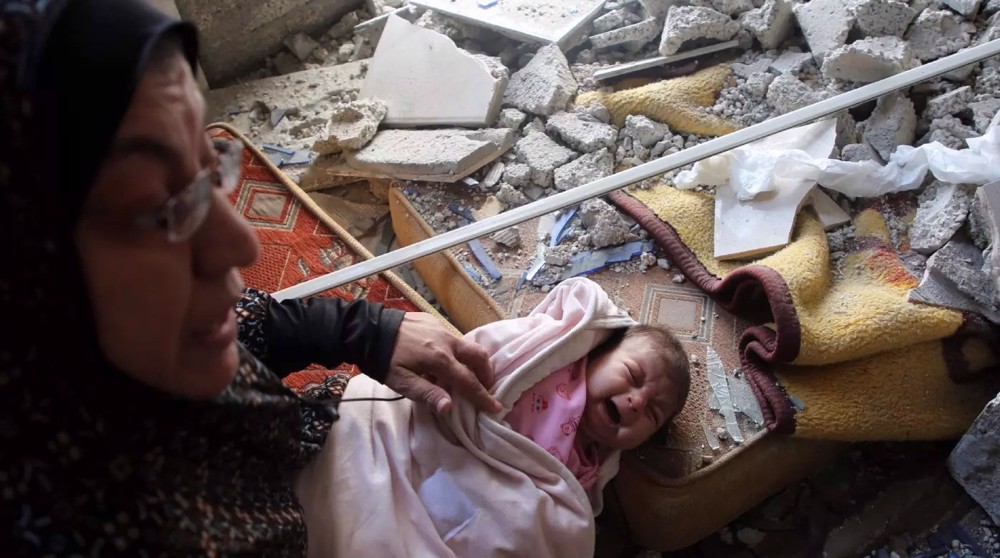
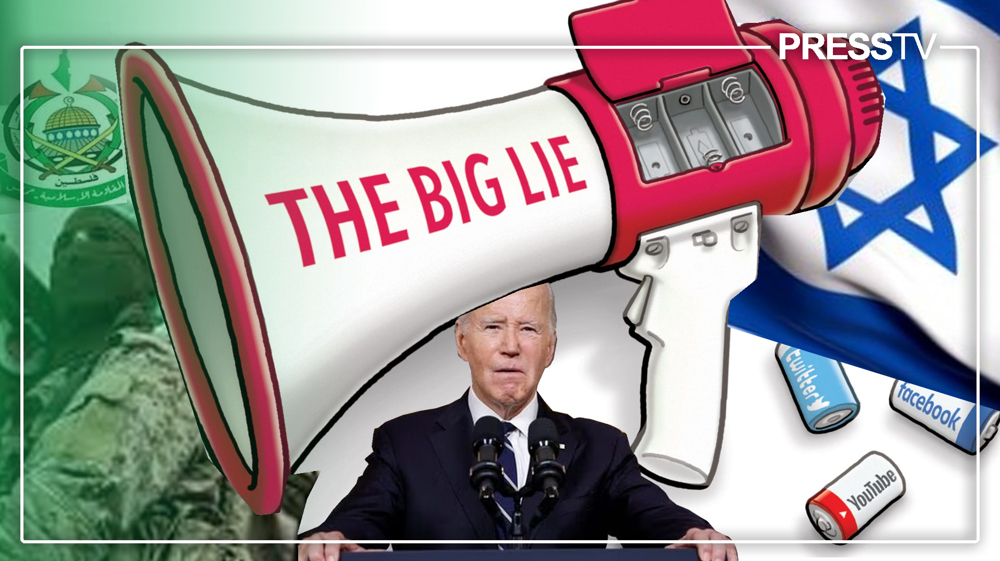

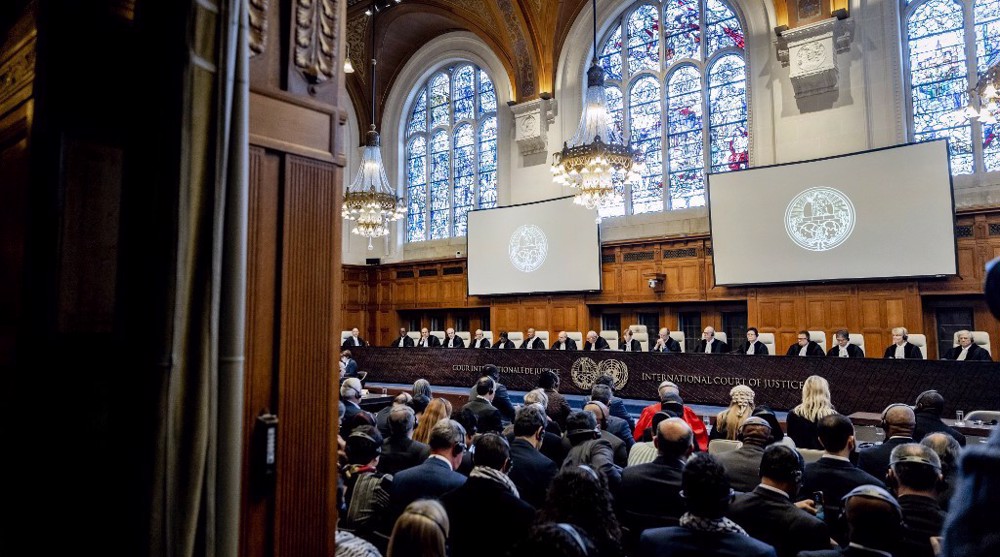
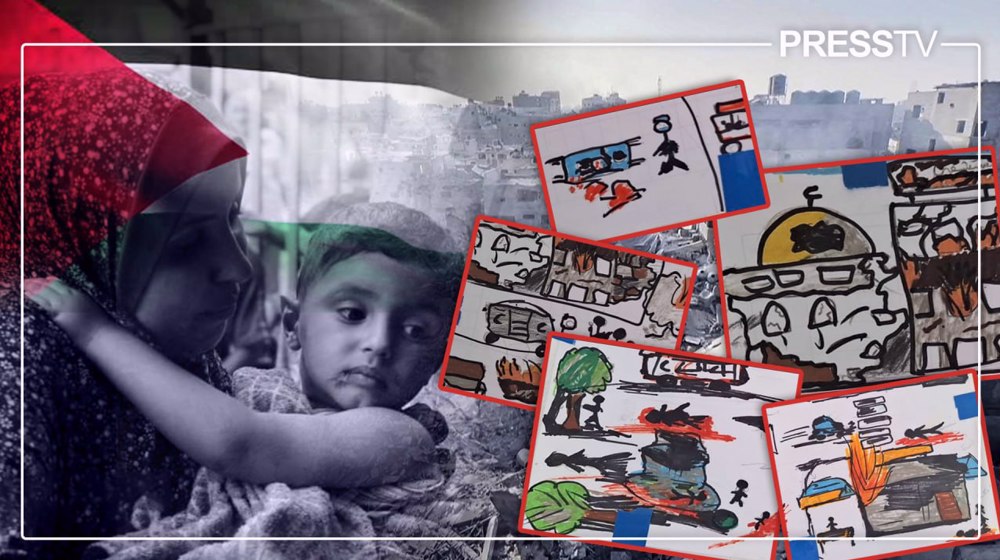
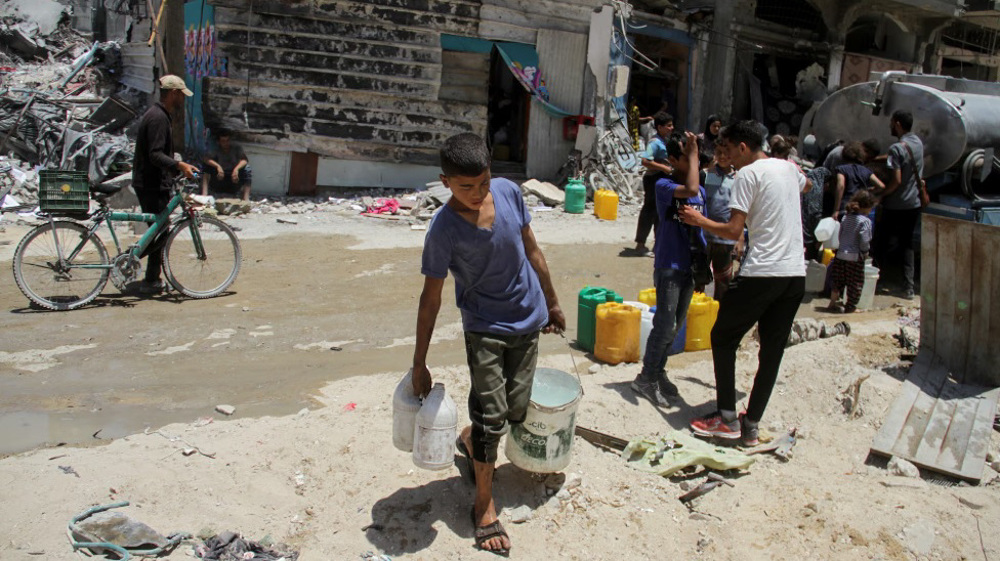
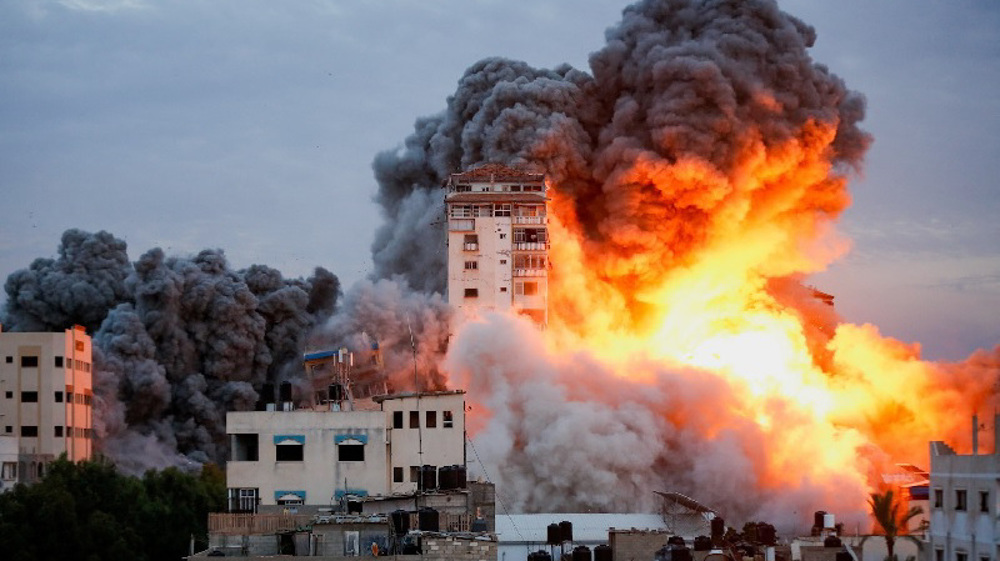

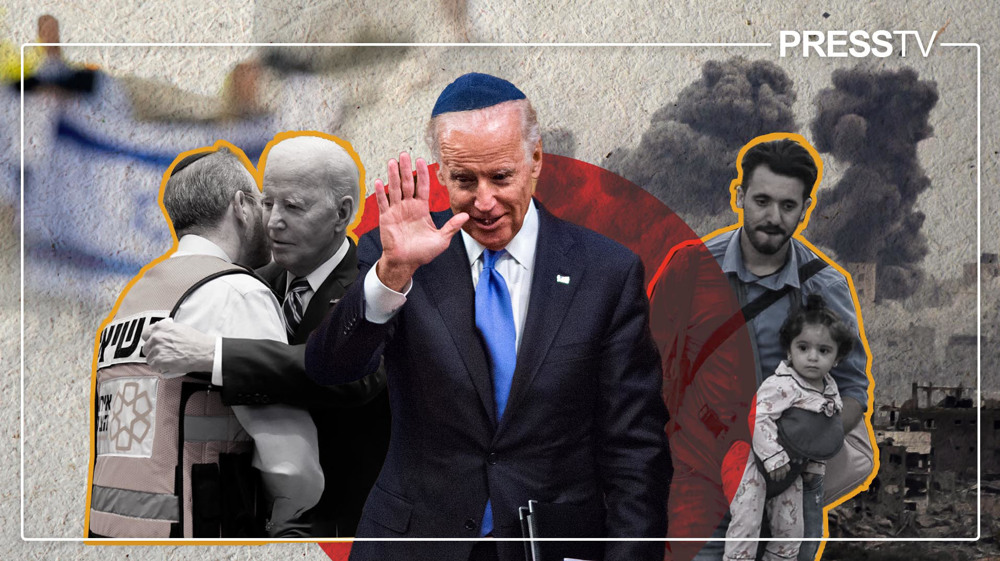

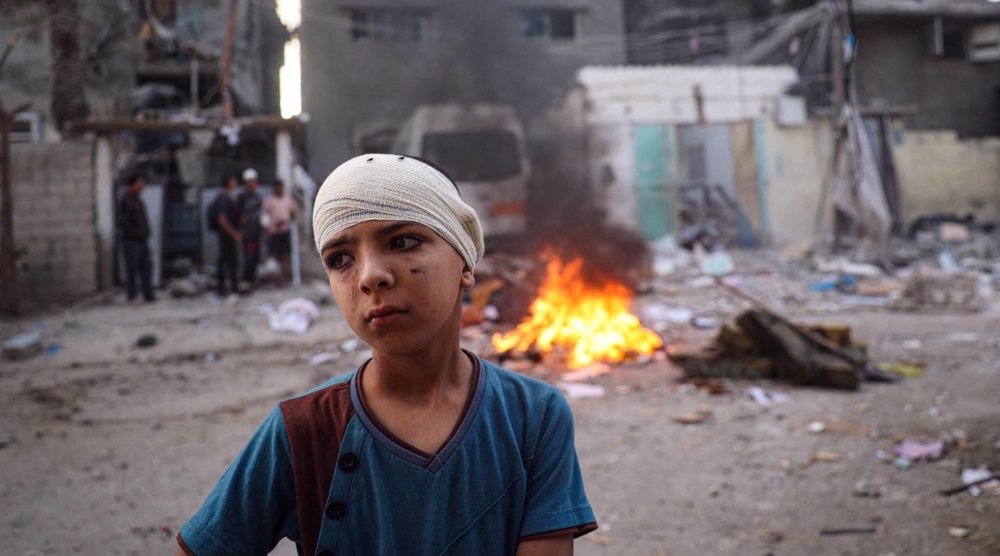
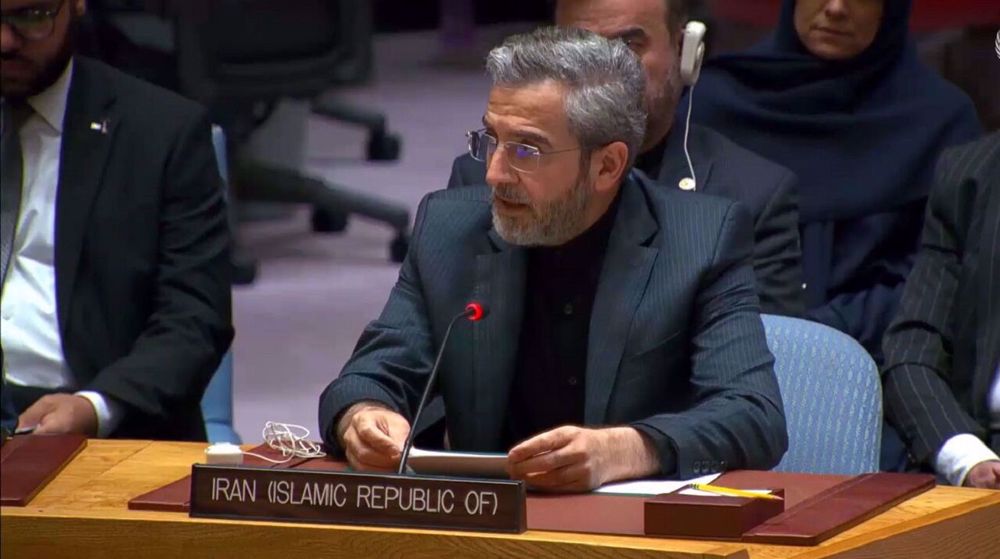




 This makes it easy to access the Press TV website
This makes it easy to access the Press TV website